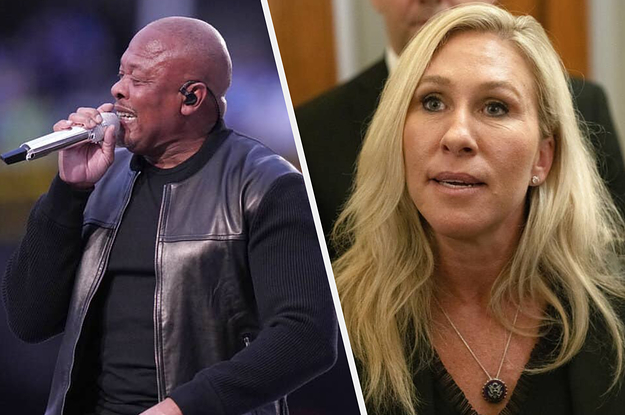Dr. Dre, the renowned rapper and producer, has accused Republican Rep. Marjorie Taylor Greene of copyright infringement. The dispute arose after Greene used the instrumental of Dre’s song “Still D.R.E.” in a video shared on Twitter. The video, which featured Greene walking in slow motion through the halls of Congress, also depicted her receiving a phone call from “DT,” presumably referring to former President Donald Trump. Dre’s lawyers promptly sent a cease-and-desist letter to Greene, expressing their disapproval and demanding that she stop using his music to promote her divisive political agenda.
In a statement to BuzzFeed News, Dre expressed his opposition to licensing his music to politicians, particularly someone as “divisive and hateful” as Greene. He accused her of wrongfully exploiting his work through social media platforms, and emphasized that he had not granted her permission to use his music. The letter from Dre’s lawyers further criticized Greene’s lack of familiarity with intellectual property laws and suggested that she should focus on making laws as a member of Congress, rather than breaking them.
The controversy surrounding Greene’s use of Dre’s music highlights the ongoing issue of copyright infringement in the digital age. Artists, particularly musicians, rely on copyright protection to ensure that their work is not misused or exploited without their consent. When individuals, including politicians, use copyrighted material without permission, it not only violates the artist’s rights but also raises questions about the ethical and legal implications of such actions.
This incident also sheds light on the power dynamics between artists and politicians. While politicians often seek to align themselves with popular culture and influential figures, they must be mindful of the boundaries set by copyright law. Dre’s response to Greene’s unauthorized use of his music exemplifies the importance of artists asserting their rights and protecting their creative work from being co-opted for political purposes.
Moreover, this case raises broader questions about the role of music in politics and the potential impact of its usage on public perception. By associating herself with Dre’s song, Greene sought to create a certain image and evoke specific emotions among her audience. However, Dre’s disapproval and legal action challenge the narrative that she was attempting to construct. This incident serves as a reminder that artists have agency over how their work is used and that they can exercise that agency to counteract attempts at manipulation or misrepresentation.
Ultimately, Dre’s accusation of copyright infringement against Marjorie Taylor Greene underscores the importance of respecting intellectual property rights. Artists, regardless of their political affiliations, deserve to have control over the use and dissemination of their work. This case serves as a reminder that politicians should be mindful of the legal and ethical implications of using copyrighted material without permission, as it not only undermines the rights of artists but also raises questions about their own integrity and adherence to the rule of law.









